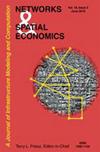Features of Russian and Chinese Direct Investments in Kazakhstan
IF 1.5
3区 工程技术
Q3 OPERATIONS RESEARCH & MANAGEMENT SCIENCE
引用次数: 0
Abstract
The purpose of the article is to analyze the results of current theoretical and empirical studies of the socio-institutional environment of Russian and Chinese direct investments in Kazakhstan. One of the features of foreign direct investment is the fact that foreign investor companies are always forced to adapt as effectively as possible to the socio-institutional environment of the country where they invest funds. Foreign direct investment is an important factor in the modernization of production and economic development, can contribute to the growth of employment and income of the population. In fact, they show how much foreign investors trust the economy of a particular country, and for Kazakhstan it is also an important indicator of the role of Russia and China in its modern economic development. The results of modern investment research allow us to conclude that there is increasing competition between Russia and China in the promotion and implementation of investment projects in Central Asia and Kazakhstan. However, the success of these projects depends not only on the effectiveness of the efforts of governments and corporations aimed at promoting them in the region as a whole, but also on how these investments are perceived by the Kazakh society. The article analyzes the different points of view of modern Kazakh, Russian, Chinese and Western researchers analyzing the specifics of the relationship between society and business with the state in the globalizing economy of Kazakhstan, economic and historical factors, socio-institutional aspects of reducing compliance risks and features of labor organization that determine the stability and sustainability of economic development中俄在哈萨克斯坦直接投资的特点
本文的目的是分析俄罗斯和中国在哈萨克斯坦直接投资的社会制度环境的当前理论和实证研究的结果。外国直接投资的特点之一是,外国投资公司总是被迫尽可能有效地适应其投资所在国的社会体制环境。外国直接投资是现代化生产和经济发展的重要因素,可以促进就业和人口收入的增长。事实上,它们显示了外国投资者对一个特定国家经济的信任程度,对哈萨克斯坦来说,这也是俄罗斯和中国在其现代经济发展中所起作用的重要指标。现代投资研究的结果使我们得出结论,在促进和实施中亚和哈萨克斯坦的投资项目方面,俄罗斯和中国之间的竞争日益激烈。然而,这些项目的成功不仅取决于政府和公司在整个地区促进这些项目的努力的有效性,还取决于哈萨克斯坦社会如何看待这些投资。本文分析了现代哈萨克斯坦、俄罗斯、中国和西方研究者的不同观点,分析了哈萨克斯坦经济全球化中社会、企业与国家关系的具体特点、经济和历史因素、降低合规风险的社会制度方面以及决定经济发展稳定性和可持续性的劳动组织特征
本文章由计算机程序翻译,如有差异,请以英文原文为准。
求助全文
约1分钟内获得全文
求助全文
来源期刊

Networks & Spatial Economics
社会科学-运筹学与管理科学
CiteScore
4.00
自引率
4.20%
发文量
26
审稿时长
>12 weeks
期刊介绍:
Networks and Spatial Economics (NETS) is devoted to the mathematical and numerical study of economic activities facilitated by human infrastructure, broadly defined to include technologies pertinent to information, telecommunications, the Internet, transportation, energy storage and transmission, and water resources. Because the spatial organization of infrastructure most generally takes the form of networks, the journal encourages submissions that employ a network perspective. However, non-network continuum models are also recognized as an important tradition that has provided great insight into spatial economic phenomena; consequently, the journal welcomes with equal enthusiasm submissions based on continuum models.
The journal welcomes the full spectrum of high quality work in networks and spatial economics including theoretical studies, case studies and algorithmic investigations, as well as manuscripts that combine these aspects. Although not devoted exclusively to theoretical studies, the journal is "theory-friendly". That is, well thought out theoretical analyses of important network and spatial economic problems will be considered without bias even if they do not include case studies or numerical examples.
 求助内容:
求助内容: 应助结果提醒方式:
应助结果提醒方式:


